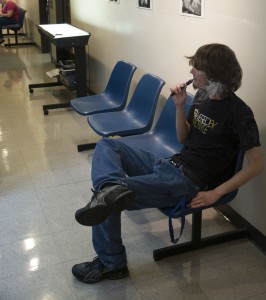By Kenney Kost/editor-in-chief

Currently, TCC policy forces smokers of traditional cigarettes off-campus or to the parking lot to sit in their cars. However, the policy doesn’t address electronic cigarettes at all.
Without a clear policy, TCC police, faculty and other college officials are forced to deal on their own with how to regulate the use of these products in the classrooms and hallways.
Several schools in the area have already banned them, such as the University of Texas at Arlington, which added electronic cigarettes to its policy in 2011, according to an October article in its student newspaper, The Shorthorn.
The University of North Texas became a smoke-free campus effective January 2013 and included electronic devices in the policy, according to its website.
Others, such as the Dallas County Community College District, have no official policy, but three colleges in the district — North Lake, Brookhaven and Cedar Valley — have added electronic cigarettes to their no-smoking policies, said administrative assistant for its district’s legal office Marilyn Herridge.
“Each school has the right to do some things on their own regarding policy,” she said.
Feelings are mixed on TCC campuses. TR student development assistant Leah Hawkins said she would like to see a policy change.
“It does bother me,” she said. “I am a nonsmoker, and I raised a family of nonsmokers. So I would like to see the same policy put in place as other tobacco products.”
South Campus student Carlos Smith said he doesn’t mind where the devices are smoked.
“It doesn’t smell bad, and when you inhale it, the nicotine is absorbed and only water vapor comes out,” Smith said.
South student Machira Howell agrees.
“As long as it’s not a real cigarette, I don’t care,” Howell said. “Those vaporizers, they don’t bother me at all.”
Other students, like TR student Camella Gandamra, are only concerned that the devices are not smoked in classrooms or in the halls.
“Smoking in class is a distraction,” she said. “And really anywhere inside is kind of disrespectful. I wouldn’t have a problem if they stepped outside on a patio or in the garage.”
Another concern people have is the lack of research on the effects of smoking the devices and secondhand smoke from them.
“The research out there isn’t enough to know whether these devices are truly harmful,” Hawkins said. “Depending on where you get your product, you may not know what else is in there. But we do know there is nicotine and know it’s harmful, so there should be a policy.”
NE student Ryan Long smokes electronic cigarettes and said he isn’t concerned with the lack of research.
“All I know is that when I started smoking these [electronic cigarettes] and stopped smoking cigarettes, I coughed up a ton of stuff just like someone who has quit smoking altogether, and I don’t run out of breath as much as I used to,” he said. “So from personal experience, I think they are a better alternative to cigarettes.”
Until there is an official policy, Long said he will continue to puff on the devices between classes.
“I wouldn’t pull it out in class,” he said. “But on campus, yes. I smoke mine [electronic cigarette] on campus between classes and have yet to be stopped by any campus police. When I used to smoke cigarettes, even in the parking lot, I would get warned about a ticket and told to go to my car.”
TR student Heather Christiansen said the only problem she has with the devices is the flavors enticing younger people who wouldn’t normally try tobacco products to try the flavors and end up addicted to nicotine.
“With early high schools and high school students graduating early, we have students who are under the age of 18. And for them to see people in the halls smoking these sweet-smelling devices, they may be enticed to try them,” she said. “That could be a problem, especially with the lack of research on the harmful effects.”

























